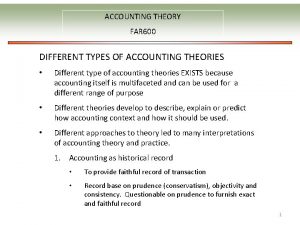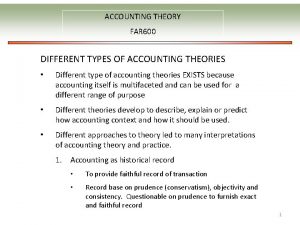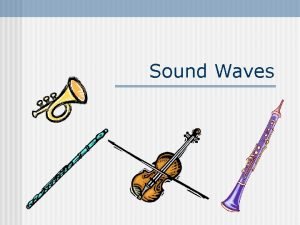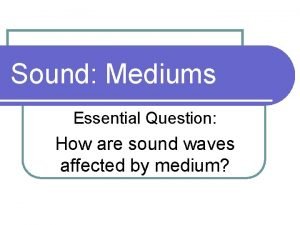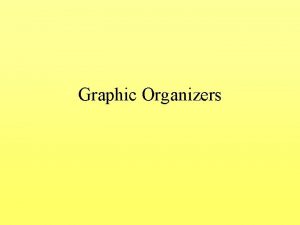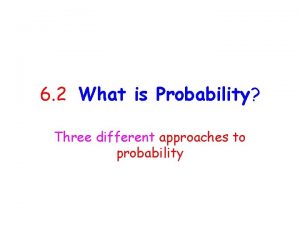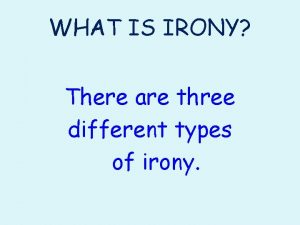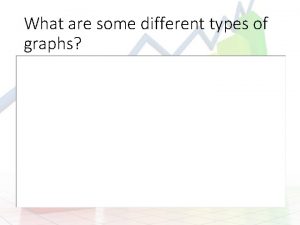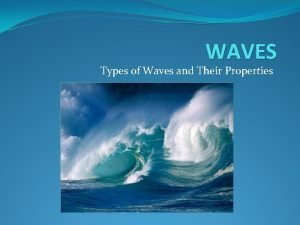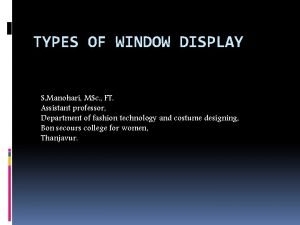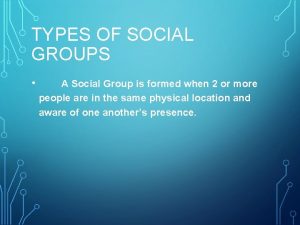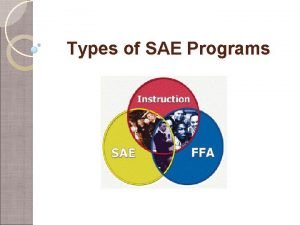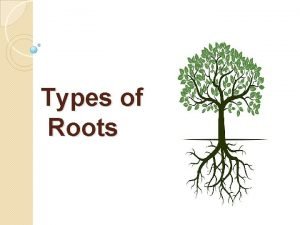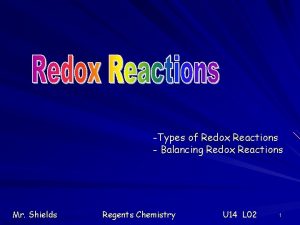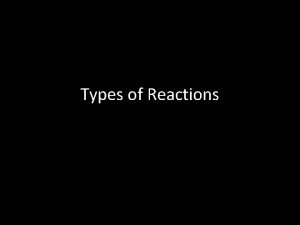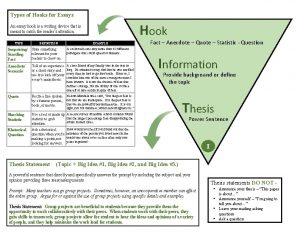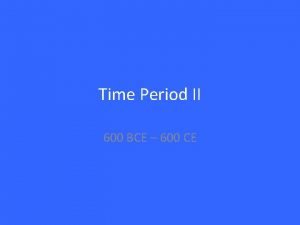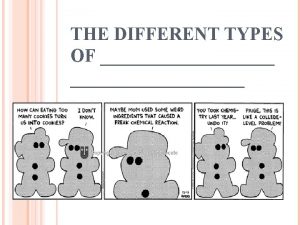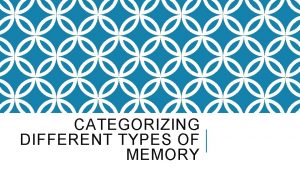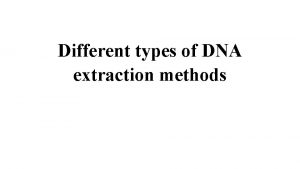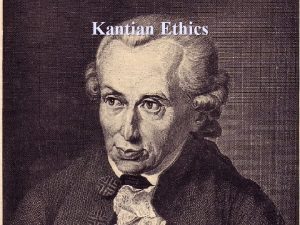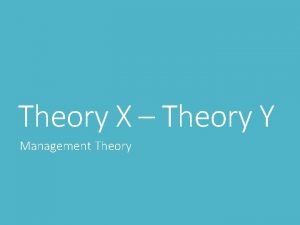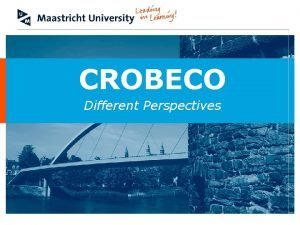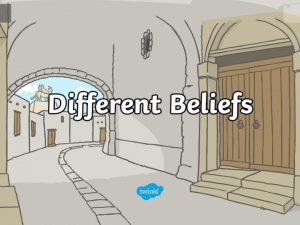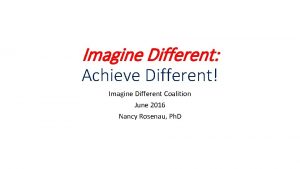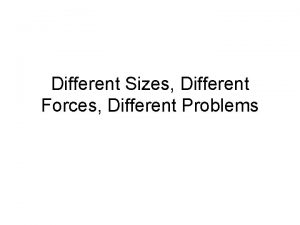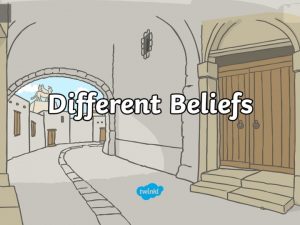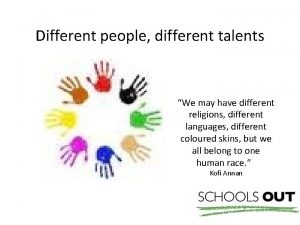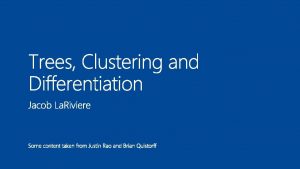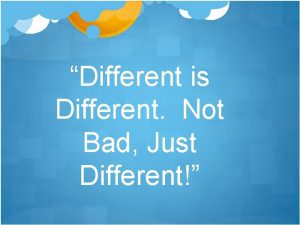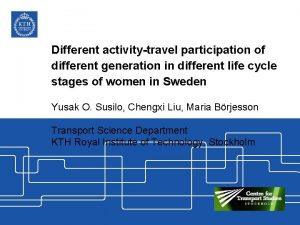ACCOUNTING THEORY FAR 600 DIFFERENT TYPES OF ACCOUNTING
































- Slides: 32

ACCOUNTING THEORY FAR 600 DIFFERENT TYPES OF ACCOUNTING THEORIES • Different type of accounting theories EXISTS because accounting itself is multifaceted and can be used for a different range of purpose • Different theories develop to describe, explain or predict how accounting context and how it should be used. • Different approaches to theory led to many interpretations of accounting theory and practice. 1. Accounting as historical record • To provide faithful record of transaction • Record base on prudence (conservatism), objectivity and consistency. Questionable on prudence to furnish exact and faithful record 1

ACCOUNTING THEORY FAR 600 DIFFERENT TYPES OF ACCOUNTING THEORIES 2. Accounting as a language • Sometimes perceived as language for management communicates with other parties. • Transaction translated into words and numbers to convey corporate performance, economic events etc. 3. Accounting as intracorporate politics • Support values and needs of specific interest groups • Accounting information to shape corporate policies 4. Accounting standard setting as politics • To serve managers own interest • Management lobby for lower taxes, increase prices and compensation etc 2

ACCOUNTING THEORY FAR 600 DIFFERENT TYPES OF ACCOUNTING THEORIES 5. Accounting as mythology • To sustain rationality for justifying and legitimizing decisions to serve other individual or social ends. 6. Accounting as magic • As a veneer to hide accounting tricks like magician making financial statement appear to reflect something not real, thus deceiving users of reports. • Disguise corporate failures (Enron in US, Harris Scarfe, Aus) 7. Accounting as communication-decision making • Action orientated for users to make decisions 3

ACCOUNTING THEORY FAR 600 DIFFERENT TYPES OF ACCOUNTING THEORIES 8 9 Accounting as economic goods • Accounting a part of broader information that includes macroeconomic, political, taxation etc. • Manager lobbies to minimize information cost • Shareholders aim to improve control and monitoring Accounting as social commodity • Agent of social change • Promote or discourage investment • Affect welfare of different groups 4

ACCOUNTING THEORY FAR 600 DIFFERENT TYPES OF ACCOUNTING THEORIES 10. Accounting ideology and exploitation • Accounting is apparatus of capitalist • Provide venue for exploiting wealth for elite interest groups at the expense of employees and society at large 11. Accounting as social club • Promote group interest and aims of accountants • Generate a professional culture and enhance a monopoly in professional knowledge • Enhance accountant’s public image of professional competence 5

ACCOUNTING THEORY FAR 600 - Syntactic 3 types of theoretical structures - Syntactic, Semantic & Pragmatic 1. SYNTACTIC • Formal processes that ensure each stage of theory follows from previous stage. • Relies on syllogism. Syllogism consist a set of premises and a conclusion eg: Premise 1 : If all accounting students are brilliant Premise 2 : And you are an accounting student Conclusion: Then you are briliiant • Does not recognise if ‘accounting student’ or ‘brilliant. ’ If the premises are true, then the conclusion is true. • Mathematically : if A, then B: A is true, therefore B is true 6

ACCOUNTING THEORY FAR 600 - Semantic 2. SEMANTIC • Relationship linking basic concept to real world. • Relationship referred to as rules of correspondence or operational definition • The truth value of a premise is established by reference to real world. • Then it establish relationship of premise to the conclusion, but not to the line of logic Premise 1 : All assets accounts have debit balance Premise 2 : Sales Return is not asset account Conclusion: Sales return account has a debit balance 7

ACCOUNTING THEORY FAR 600 - Pragmatic 3. PRAGMATIC • Theories generally do not have pragmatic aspect • Involves relevance, or importance of theory to 8

ACCOUNTING THEORY FAR 600 Dogmatic, Self-evident and Scientific tests of the ‘truthfulness’ of theories Dogmatic – acceptance of a theory simply because and authority (religious leader, lecturer or politician) says that it is a good theory. It relies on the individual’s opinion about the authority, not objective evidence. Self-evident – individual’s own assessment of the reasonableness of theory. Depends on the person’s memory, understanding and ability to analyze (without thorough and detailed process) whether theory is appropriate. Scientific – includes evaluation of the whether the said rules are logically valid. Induction to see whether the predictions of theory hold in the real world, and falsification (when the researcher attempts to evaluate theory to see whether testing on it will show false predictions). 9

ACCOUNTING THEORY FAR 600 – Inductive & Deductive DEDUCTIVE VS INDUCTIVE APPROACH Inductive approach (small to big, specific to general) - involves reasoning from a series of specific observations or specific statements, to a general statement. This approach suffers from ‘inductive leap’ – a logical flaw which means that unless we have observed ALL SPECIFIC examples of the matter in question, it is impossible to confirm wether the concluding statement is always true. Deductive approach (big to small, general to specific i. e. deduct) – involves reasoning from general statements to predicting specific outcomes. If all of the statements in theory development process are true and the logic is valid, then the conclusion of theory is true (deductive approach). 10

ACCOUNTING THEORY FAR 600 – Inductive-Deductive Cycle 11

ACCOUNTING THEORY FAR 600 – Inductive-Deductive Cycle 12

ACCOUNTING THEORY FAR 600 - Terminology Empirical refers to evidence derived from experience, commonly thought of as observation. Empirical is frequently associated with numbers, the natural sciences and positivism. It does not imply measurement by numbers and can involve narrative description. Epistemology is to do with how we know things or theory of knowledge Methods refer to rules by which a particular action is carried out. Methodology is the analysis and study of method, frequently concerning its objectives, underlying assumptions and the criteria for judging the correct method Ontology is concerned with the nature of the existence that is under consideration and the assumptions and theory or belief system that are concerned with the particular existence 13

ACCOUNTING THEORY FAR 600 - Normative Theories • 1950 s and 1960 s called ‘golden age’ where researchers concentrated with policy recommendation and with what should be done instead of analysing and explaining what was practice. • Concentrated in deriving ‘true income’ (profit) for an accounting period and to derive to a single measure of assets and unique (and correct) profit. However, there were no agreement what constitute a correct or true measure of value and profit. Literatures concentrated on academic debates of merits and demerits of measurement system • Discussing accounting information for making useful decision to aid decision making process for the users by furnishing useful and relevant data. • Decision usefulness theories make adjustments to historical cost measures to account for inflation or market value of assets, thus, in essence, measurement theories of accounting. Normative in nature because they make the following assumptions: 14

ACCOUNTING THEORY FAR 600 - Normative Theories • Accounting should be a measurement system • Profit and value can be measured precisely • Financial accounting is useful for making economic decisions • Markets are inefficient or can be fooled by ‘creative accountants. ’ • Conventional accounting is inefficient (in information sense) • There is one unique profit measure. These assumptions were rarely subjected to empirical testing 15

ACCOUNTING THEORY FAR 600 - Positivism Positive (Empirism)Theories • During the 1970 s, accounting theory reverting to empirical methodology, known as positive methodology. • The philosophy of logical positivism, all meaningful statement must be capable of verification. • Positivism or empiricism means testing or relating accounting hypothesis to the real world. • A typical approach was to survey opinion or test assumed importance of accounting outputs - inflation accounting, profit as determinants of share valuation, cost exceed benefits, or different accounting techniques affected value. • Positive Theory to explain the reason for current practices and predicting the role of accounting for economic decisions. • Positive Theories are tested based on scientific approach. 16

ACCOUNTING THEORY FAR 600 – Normative versus Positivism Normative & Positive Theories • Main difference Normative Theories are prescriptive, whereas Positive Theories are descriptive, explanatory and predictive. • Normative prescribe how accountant should behave to achieve an outcome judged good or moral. • Positive Theories describe how people behave and why, or predict what people will do (regardless of right or wrong) 17

ACCOUNTING THEORY FAR 600 – Positivis POSITIVISTIST ONTOLOGY – the philosophy Believe in objective reality that causally determined and knowable to the observer. Belief is passive reality – where behavior maybe assumed to be predictable and characterized by constant relationship. Order and stability is seen as the norm and disorder is seen as dysfunctional. Dysfunctional activities can be corrected by applying appropriate remedies. A n unfavorable budget being remedied by implementing corrective accounting control. 18

ACCOUNTING THEORY FAR 600 – Positivist Epistemology POSITIVISTIST EPISTEMOLOGY Based on inductive approach to reality, theory and observation are seen as separate. The role of observation is to test theory. A set of observation can confirm or verify theory. Theories that cannot be proved may be found to be false. Early accounting researchers share the same epistemology based on causal observation and from conclusions of others. Positivism arose out of disillusion with deductive theorising and sterile debate between theorist which could only be resolved by testing the evidence. By extending this research into accounting, it is maintained that only empirical (positivist) research can show what information users would need in practise. Positivism, as Chua (1986) identifies, become the mainstream accounting research method and leading accounting academic journals (Journal of Accounting Research, Accounting Review etc) reflect this preference. 19

ACCOUNTING THEORY FAR 600 – Positivist Epistemology Positivism uses hypotheses which lay claim to general principles or universal laws. Such hypothetic deductive explanations are tested empirically by observation and subject to rigorous statistical analysis to arrive at a generalization, which links explanation, prediction and technical control. Thus, knowing the premise before the event, enables prediction and control over the occurrence of the event. Control and manipulation is important in a scientific explanation. Analogy of chicken pox and smallpox illustrate the linking of explanation, prediction and technical control in positivist research. 20

ACCOUNTING THEORY FAR 600 – Criticisms and Limitations of Positivism NEUTRAL? Can observation be absolutely upheld to be truly neutral? Cases of distortion or misread findings to advance ideological interest are not uncommon. Today, scientist using the same data present conflicting accounts. WHAT IS Positivism is concerned with “What is” type of question and less with explanatory “why” questions, thus renders itself conservative. Alternative methods that cannot be generalize or its outcome cannot be predicted are considered illegitimate. NATURAL PHENOMENA The world is seen as a complex model and nature is accepted as a phenomena regulated by impartial forces, which are inevitable and universal. Any form of regulation is viewed unfavorably. Positivism accept the principle of utility maximization – that people are rational but greedy and their behavior is predictable. 21

ACCOUNTING THEORY FAR 600 - Accounting and Positivism POSITIVISM is characterized by a search of the universal laws from which hypotheses may be deduced. From the discovered universal regularities, causal relationship are sought. Thus accounting positivist assumes the accounting world is knowable and characterized by constant relationship. Accounting theories must then predict and explain. METHODOLOGY Accounting research begins with a hypothesis, followed by a discussion of data and ends with an assessment of whether the data supports the hypothesis via the use of samples, surveys and statistical methods. Examples of this process includes various behavioral and multi-probability studies, investors reactions to financial information, the efficient market hypothesis and agency theory. Accounting researchers assume free market have a tendency to social order and if left alone, will rectify itself. Thus people and market will achieve order by themselves. 22

ACCOUNTING THEORY FAR 600 - Accounting and Positivism AUDIT Auditing evolved before government regulation made it mandatory for public companies. Audit that goes wrong becomes dysfunctional, which implies a need for rectification to reestablish a natural order. MANAGEMENT Similarly, shareholders, managers, inter department, accountants and clients are all manageable via appropriate techniques such as budgets, accounting standards, audit etc. Conflict is viewed as dysfunctional and can be rectified. CAUSAL EMPIRISM Conducting survey by seeking views of their members and from a rough consensus, developed standards, guidelines and conceptual frameworks. 23

ACCOUNTING THEORY FAR 600 - Accounting and Positivism CAUSAL EMPIRISM popular among accountants: • Provides a means of evaluating and improving current accounting • It suits market for professional training based on accounting technique. Accounting education is dominated by concepts (accrual, matching, materiality) derived from practice. • Is a means of justifying current practices by assuming objectivity while avoiding strict quantitative procedures. The 1970 s and the 1980 s continued with the progression in terms of associated rigorous statistical testing of deductively derived hypotheses and the development of predictive models of economic and human behavior. Causal empirism, is however, constraint by current practices and cannot cope with problems outside existing practice where a novel approach is required. 24

ACCOUNTING THEORY FAR 600 For example, the debate over historical cost versus revaluation as a basis of asset management depends on whether untried methods of measurement can succeed and cope with the distortions produced by inflation. Conceptual frameworks raise difficulties of relevance versus reliability, which cannot be resolved by reference to current practice. Even specific problem areas like goodwill and other intangible assets need to be resolved in a wider context than simply referring to the current practice. The 1970 s and the 1980 s continued with the progression in terms of associated rigorous statistical testing of deductively derived hypotheses and the development of predictive models of economic and human behavior. 25

ACCOUNTING THEORY FAR 600 - Alternative The 1980 s and 1990 s seen the rise of a considerable variety accounting research that attempt to address some of the above problems. The period saw the growth in research literature on critiquing structures, policymaking, and ethical codes of the accounting profession, gender in accounting, social and environmental strategy and disclosure, public sector disclosure and accounting change, accounting communication, not -for-profit sector accounting etc Critical and interpretative (alternative) research focuses on documenting and explaining context, causes and consequences of events, decisions and relationships. Alternative research does not abstract measurable variables, establish models, and explaining relationship in quantifiable terms. It is concerned with the case studies aimed at explaining events and relationship. 26

ACCOUNTING THEORY FAR 600 – Agency Theory is descriptive rather than prescriptive and refers to the agency relationship existing between various groups due to the separation of ownership and capital that is the basis of capitalism. An agency relationship arises where there is contract under one party (the principal) engages another party (the agent) to perform some service on the principals behalf. Under the contract the principal delegates some decision making authority to the agent. The core belief is that all parties seek to maximize income. The agency problem is inducing the agent to maximize the principals welfare. However, agents or managers may cheat and to avoid loss, the principals must bear agency cost that includes: • Monitoring costs of agents (controlling the agent’s behavior) • Bonding costs whereby agents try to show they are not self serving by voluntarily provide shareholders with regular financial reports etc • Residual losses that are too trivial and too costly to monitor. Agents ultimately bear these costs. The greater the cost, the lower the agents reward. Thus agent will reduce cost by bonding activities: voluntarily appointing independent directors, audit committees and releasing interim results. 27

ACCOUNTING THEORY FAR 600 – Agency Theory An example of Agency Theory is the Efficient Market Hypothesis which 3 levels of market efficiency: 1. That share prices reflect market trends 2. That share prices reflect all publicly available information 3. That share prices reflect all information - even inside information Thus the market cannot be duped by changes in accounting practices. “the market cuts through the bullshit. Anything like that we detect we adjust for. We cut through cosmetics. To arrive at what is actually happening. ” The Independent, 3 May 2000. The Agency Theory belief that market forces, if left alone, will arrive at a perfectly competitive equilibrium with private contracting cost reduced to a minimum. Government regulation would upset the equilibrium and increase contracting costs. The assumption is challenged. Companies prefer secrecy to openness. Griffiths claims “Every company in the country is fiddling its profits. Every set of accounts is based on books which have been gently cooked or completely roasted. ” 28

ACCOUNTING THEORY FAR 600 – Agency Theory Companies also use their monopoly position to under supply information and try to sell information at a high price. Bay making reporting more mandatory, more information can be produced at a lower cost to users. There are companies releasing account late, accompanied by unqualified audit report, without including details of related transactions and not complying with Generally Accepted Accounting Practice (GAAP). 29

ACCOUNTING THEORY FAR 600 – Contracting Theory characterises the firm as a nexus (connection) of contractual relationships among suppliers and consumers of factors of production. The firm exist because it costs less for individuals to transact (or contract) through a central organization than to do so individually. Ice cream analogy. Rather than individual suppliers of factors of production (land, labor and capital) contracting with individual consumers of their output, contracts are struck within ‘the firm’ between classes of suppliers and consumers of factors. The existence of firms is that they are efficient means of organizing economic activity because they reduce contracting cost. Positive accounting theory focuses on 2 types of contract: 1. Management Contracts 2. Debt Contracts Both are agency contracts, and agency theory provides a rich source of explanation for existing accounting practice. 30

ACCOUNTING THEORY FAR 600 – Past Exam Topics Apr 2008 1. Age of Stagnation 2. Zakat 3. Accounting stds 4. CCA 5. Exit price 6. Creative acc 7. Taking a Bath, Inc Mini, Income maxi, Inc smoothing 8. Corp accountability 9. Enviromental Accounting 10. MASB. Stewardship concept Apr 2009 1. Conceptual framework/relevance and reliability 2. MASB 3. Acc Standard 4. Creative accounting 5. R&D 6. Social Contract 7. Corp and Social Environment reporting Oct 2009 1. Zakat 2. Diff bet Islamic &conventional 3. Challenges concept of Islamic accounting 4. Why managers manipulate acc 5. Creative Acc 6. Exit Price 7. Free Market vs Regulatory approach 8. MASB R&D Oct 2008 1. 1959 – 1973 2. MIA 3. Adv & Disadv of pragmatic approach. Difference between Normative & Positive 4. MASB 5. Why Historical Cost accounting not objective Yet Agency, Contractual 6. Income smoothing 31

ACCOUNTING THEORY FAR 600 – Agency Theory 32
 From fog to endless night figure of speech
From fog to endless night figure of speech On sour cream walls donations shakespeare's head
On sour cream walls donations shakespeare's head In a kingdom far far away
In a kingdom far far away Far far away city
Far far away city Trigonometri
Trigonometri Accounting theory
Accounting theory Types of accounting theory
Types of accounting theory Why do different polymers have different properties
Why do different polymers have different properties Technicolor test
Technicolor test Sound will travel at different speeds in different mediums.
Sound will travel at different speeds in different mediums. Library thinkquest org 19537
Library thinkquest org 19537 Cultural relarivism
Cultural relarivism Different angle different story
Different angle different story Different faces different places song
Different faces different places song Different materials have different
Different materials have different Things that make us different
Things that make us different Venn diagram different same different
Venn diagram different same different What are the different approaches of probability
What are the different approaches of probability How is a scientific law different from a scientific theory?
How is a scientific law different from a scientific theory? There are many kinds of love
There are many kinds of love Different types of irony
Different types of irony Different types of serial killers
Different types of serial killers What are the different types of graphs
What are the different types of graphs Different types of waves
Different types of waves Www.youtube.com
Www.youtube.com 20kn
20kn Angled window display
Angled window display Different types of social group
Different types of social group Research/experimentation sae examples
Research/experimentation sae examples Types of root system
Types of root system Balancing redox reactions
Balancing redox reactions Example of single replacement reaction
Example of single replacement reaction Informative essay hooks
Informative essay hooks





